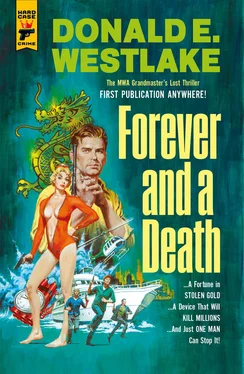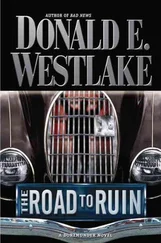Curtis shrugged. “As I say, I’m hoping you’ll have the opportunity to ask the fellow in person.”
“I’m to find him.”
“Yes, you are.”
Bennett said, “I’m to move into their hotel, bug their telephone, follow them when they go out. But, sir, I don’t know the people working here, how would I recognize the right fellow? I mean, if I hear a conversation on the phone, all well and good, but what if it’s just a meeting out on the street, or lunch, or whatever? It could be the right man, or it could be the wrong man.”
“Buy yourself a Polaroid camera,” Curtis told him. “You’re just a tourist, snapping photos, only the photos contain anybody Diedrich talks to.”
“Right, sir,” Bennett said, smiling. “That’s good.”
“Bring the pictures here, show them to me or, if I’m not here, Margaret. We’ll know if it’s one of our people.”
“I’ll do that, Mr. Curtis,” Bennett said, and there was a single knock at the door.
Curtis crossed to open the door, and it was one of the clerks, a young man named Hennessy, holding a thick white envelope, saying, “Miss Kembleby told me to bring this round, sir.”
“Thank you, Hennessy.”
Handing over the envelope, Hennessy gave Bennett a quick look of curiosity before Curtis closed the door. Curtis gave the envelope to Bennett and said, “If you need more, phone Margaret.”
“Oh, I won’t need all this much, sir.”
“Colin,” Curtis said, “I want you to buy yourself some fresh clothes. You know, to look a little more like an affluent tourist.”
Bennett, of course, understood that Curtis was actually saying, to look less defeated and shabby. His grateful smile was as much for Curtis’s tact as for his money.
“Thank you, sir,” he said. “From the bottom of my heart, thank you. You can count on me.”
Jerry couldn’t help his impatience, but it would be folly to call Mark during the day, at work. So they’d have to wait till the evening.
They were staying at an acceptable hotel in Little India, and they spent the morning familiarizing themselves with the area, which was mostly Hindu temples. The Veeram Kali Amman Temple, dedicated to Kali, the goddess of death and destruction, was the most dramatic, with its garish illustration of the black-skinned four-armed goddess ripping apart a human being who’d gotten too close. She was flanked by her sons, Ganeshi the elephant god and Murugan the child god, but she didn’t seem to Jerry particularly maternal.
At lunchtime they chose one of the handy vegetarian Indian restaurants. The meal was very good, in fact delicious, but it finished Jerry off. “No more,” he said. “If you two want to wear yourselves out, go ahead. I’m going back to the hotel and sleep for an hour. Maybe two.” Luther wanted to keep going but Kim sided with Jerry, and they separated outside the restaurant, Luther off to the local subway while Jerry and Kim limped homeward. A shower, Jerry kept thinking. That’s all I want, a shower, and then lie down and wait for Luther to come back.
The hotel facade had been given a gaudy overlay on the ground floor during a recent remodeling, large rectangular panels of golden plastic around a wide pair of dark-tinted glass doors. As Jerry and Kim neared the doors, Jerry already sensing the coolness within, smelling the clean water of the shower that awaited him, he heard an odd familiar sound, a kind of ripping or crinkling, and thought, I know that sound, and turned to see a man with a Polaroid camera, standing out at the curb, facing the hotel. The picture he’d just taken extruded even now from the camera, still formless and gray.
Jerry, not liking the idea, said, “Did you take our picture?”
“No, no,” the man said. “The front of the hotel.” He was a big burly man in a short-sleeved white shirt and pressed tan chinos. Filipino or Samoan, maybe, in his forties.
Jerry found the man intimidating, mostly because of his size, and he didn’t feel like forcing the issue. Still, privacy mattered for them right now. He said, “You’re sure we aren’t on that.”
“Well, I don’t know,” the man said, and looked down at the not-yet-developed picture. “It’s just for me,” he said, “the hotel where I’m staying.” The man shrugged. “If you’re in it, I’ll throw it away and take another one.”
Jerry sighed and decided it was good enough.
Kim had already gone in, drawn by the hope of air conditioning, and stood waiting for him in the lobby. She said, “What was that all about?”
“I don’t know, he was taking a picture of the front of the hotel, I thought we might be in it.”
Jerry looked back at the street, where the man hunched again over his camera. Moving farther from the doors, he said, “Taking a picture of the front of the hotel. Can you believe it?”
“Tourists take pictures of anything,” Kim assured him. “He wants to show his friends where he stayed in Singapore.”
“A Polaroid?” Jerry said. “Of this place?”
“I’m going to my room, Jerry, call me later.”
“Wait wait, I’m coming.”
Riding up in the elevator, Jerry thought, I’ll sleep until Luther comes home, and then I’ll be with Luther until it’s time to call Mark. Six? Yes; call Mark at six.
He’d completely forgotten the tourist with the Polaroid camera.
Morgan Pallifer was nearing the end of his rope. Not only was he stuck on land, extremely dry land at that, with no significant body of water for hundreds of miles in any direction, but his job had somehow been reduced to that of babysitter. No action in it at all, no movement. Nothing to do, day and bloody night, but play nanny, with assistant nannies Steve and Raf. Now, there was nothing wrong with Steve and Raf, Pallifer had chosen them because they were professional and reliable in a crisis, but if you didn’t happen to have a crisis on your hands, those two were not what you might call stimulating company.
As for George Manville, Pallifer found him a disgusting disappointment. Where was the fire, the resistance, the defiance? Where were the escape attempts, the maneuverings to get at a telephone or a vehicle, the confrontations with his jailers? But no; all Manville did was sit around and read.
So Manville provided no diversion. The telly couldn’t hold him long (it could apparently hold Steve and Raf forever), and there wasn’t anything about ranch life that interested or amused him. He hadn’t spoken with Curtis or anyone else in the outside world since the hugger-mugger about pretending to be both George Manville and in Singapore. Except for the food, this was like being in jail.
Pallifer was seated on the verandah of the spare barracks on Tuesday afternoon, squinting out at the dry brown land in all that sunlight, wondering if he dared leave Steve and Raf here on their own for a day or two, to watch over Richard Curtis’s favorite engineer while Pallifer found himself a town somewhere on this continent with some action in it, and reluctantly he was acknowledging to himself that the newly richer relationship with Curtis was too valuable to risk, when the ranch manager, Farrelly, came out of the main house across the way and walked in this direction in the baking sun, little dust puffs rising around his boots at every step.
Pallifer watched him come, feeling mingled distaste and hope. He knew that both the Farrellys disapproved of him, as being some sort of unacceptable roustabout, and he returned the favor in spades; but would Farrelly be coming here with some sort of message? Something to end this damn inactivity?
Yes. “Phone for you,” Farrelly said, when he was close enough. “In the office.” And he turned around and headed back.
Читать дальше







![Дональд Уэстлейк - Enough [A Travesty (novel) and Ordo (novelette)]](/books/416846/donald-uestlejk-enough-a-travesty-novel-and-or-thumb.webp)
